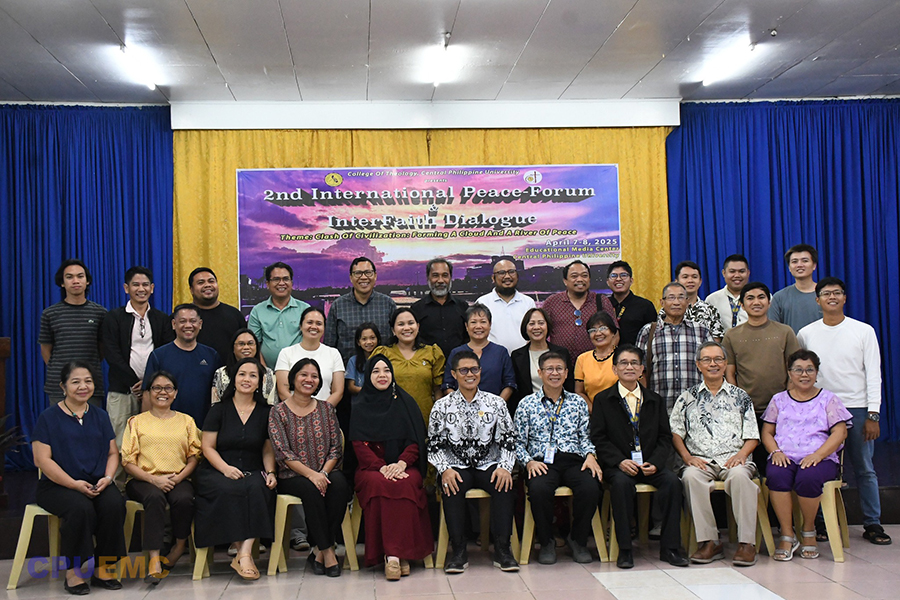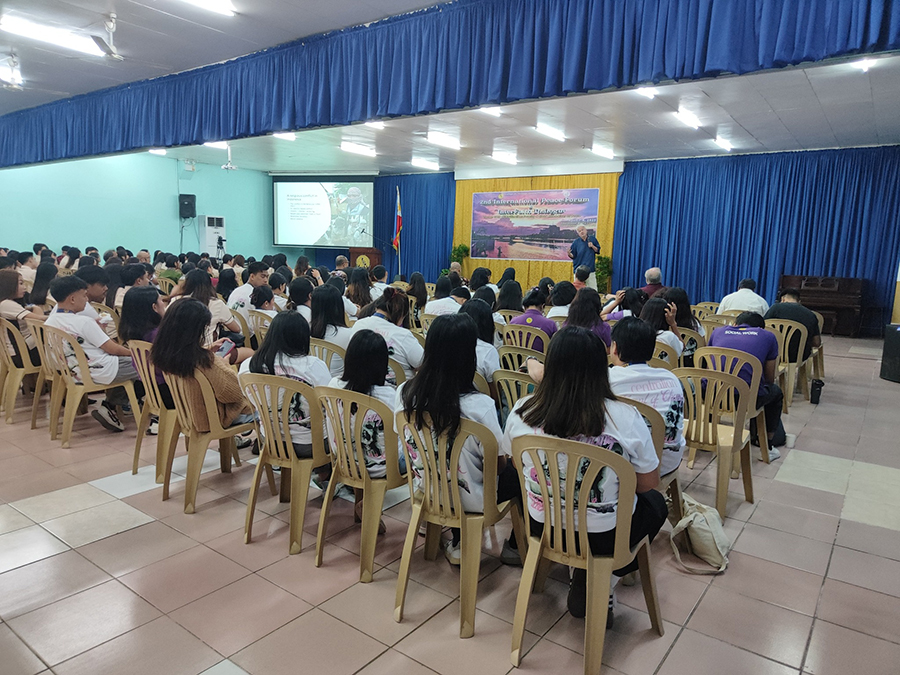By Mikee Natinga Norico
Faculty and staff from CPU COT, along with students, invited guests, and some guest lecturers, gather for a group photo during the 2nd International Peace Forum and Interfaith Dialogue, which brought together diverse voices in the pursuit of peace and justice.
With the theme “Clash of Civilizations: Forming a Cloud and a River of Peace,” the 2nd International Peace Forum and Interfaith Dialogue was successfully held on April 7–8, 2025, at the EMC Conference Room of Central Philippine University. This two-day forum was a joint initiative between CPU’s College of Theology (COT) and the Pontianak State Institute of Islamic Studies, Indonesia, bringing together students and scholars from diverse academic backgrounds and faith traditions to advocate for peace and social justice.
Students from the College of Education (COED), College of Theology (COT), and the Bachelor of Science in Social Work program were the primary attendees of the event, which featured global perspectives and open conversations on interfaith harmony, gender justice, social healing, and the responsible use of social media in peacebuilding. Faculty members of Silliman University were also able to join the event.
The event opened with welcome remarks from Engr. Dany C. Molina, Vice President for Administration, and Officer-in-charge of the Office of the President. He warmly welcomed international guest lecturers from Sweden, the USA, Australia, Indonesia, and the Philippines. He also highlighted the essential role of peace in driving social and economic development, underlining the importance of interfaith dialogue in nurturing understanding, shared values, and inclusive communities.
Students from the College of Education, College of Theology, and the Bachelor of Science in Social Work program actively engage during Prof. Dr. Tomas Lindgren’s discussion on religious conflict, identity dynamics, and intergroup emotions.
Dr. Bernabe C. Pagara, Dean of the College of Theology, echoed this sentiment in his welcome address. He described the forum as a platform for building justice, compassion, and reconciliation through mutual respect and collaboration. He called on participants to become active peacemakers in their communities.
Dr. Jerson B. Narciso, forum convenor, presented the rationale behind the event, followed by the recognition of participants by Prof. Joshua Zonita, the project proponent.
The forum featured engaging lectures from peace advocates and scholars across disciplines. On the first day, Prof. Dr. Tomas Lindgren from Sweden spoke on religious conflicts and identity dynamics, urging participants to expand their moral circle and understand the complex emotions involved in inter-group relations.
Dr. Liza Lamis, in her talk on Gender Justice Towards Peacemaking, emphasized the urgency of including marginalized communities in peace efforts, especially those grappling with gender identity issues.
The afternoon session continued with thought-provoking presentations, including Asst. Prof. Joshua Zonita’s “The Black Swan Peace and the Useful Harm,” Rev. Dr. Graham Joseph Hill’s discussion on “Polyvocals in Dialogue,” and Bishop Timothy Wilbur’s reflections on “Peace as Social and Cultural Healing.”
On the second day, Dr. Lindgren returned to explore “Nonviolence, Religion, and the Moral Mind,” while Prof. Dr. Zaenuddin Hudi Prasojo from Indonesia spoke on “Embracing Multiculturalism and Fostering Peacebuilding.” Dr. Mary Grace Labis highlighted the need to include persons with disabilities in peacebuilding processes.
One of the most impactful talks was delivered by Rev. Dr. Francis Neil G. Jalando-on, Director of CPU’s Office of Communications, who tackled the dual nature of “Social Media in the Pursuit of Peace.” With over 5 billion users worldwide and nearly 91 million in the Philippines alone, he emphasized social media’s powerful potential to connect, mobilize, and educate. Citing examples like #Peace, TED Talks, and international protest movements, he illustrated how online platforms can become vehicles for advocacy. However, he also warned of its dangers—echo chambers, misinformation, and superficial activism. Drawing on real-world case studies, Dr. Jalando-on stressed the need for responsible, intentional engagement on digital platforms to truly build peace.
The open forum, held on both days, offered participants an opportunity to engage in meaningful discussions with the speakers, share personal insights, and pose questions related to the topics presented. This session encouraged the exchange of ideas and fostered a collaborative environment for finding solutions to the challenges discussed.
As a token of appreciation, all invited speakers were presented with certificates of recognition immediately after their respective discussions. These certificates were given to honor their expertise and invaluable contributions to the forum.
The forum concluded with a symbolic gesture of unity as participants formed a circle, engaging in handshakes and personal exchanges. The event closed with a prayer, sealing the shared commitment to peace, dialogue, and inclusivity.
Through its international collaboration and multifaceted discussions, the 2nd International Peace Forum and Interfaith Dialogue at CPU served as a significant step toward building a more just and peaceful world—one conversation at a time.


